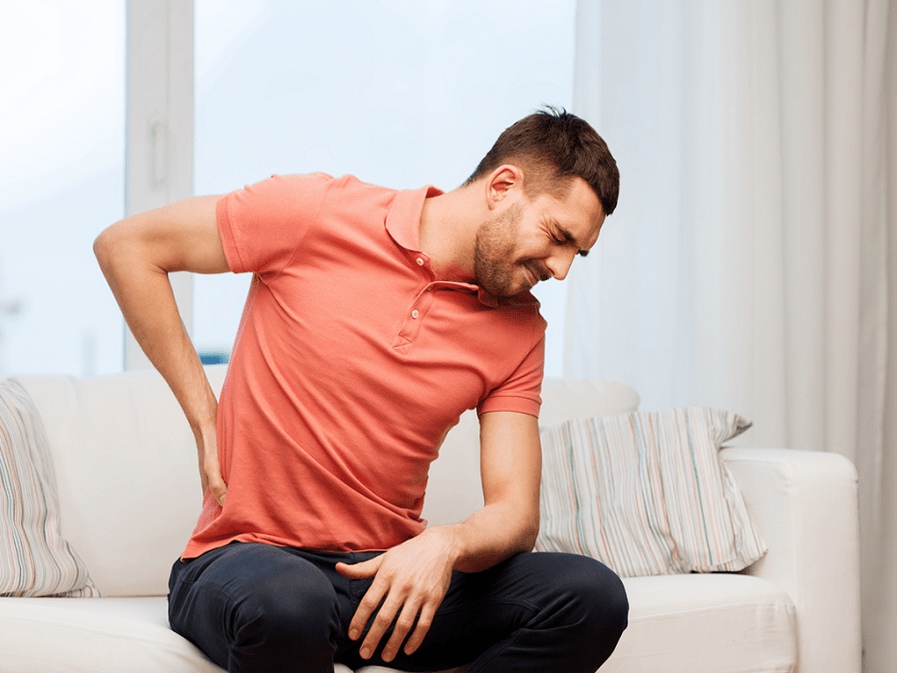
Low back pain can be associated with a variety of reasons - for example, muscle injury, intestinal pathology, vertebral disc protrusion and herniation. It is impossible to determine the exact cause on your own. Therefore, if any discomfort occurs, it is necessary to make a diagnosis and follow the doctor's recommendations. In most cases, medications and procedures are used for treatment. But surgery may also be needed.
Pains in the lower back: reasons
Low back pain can be associated with the spine, muscles, nervous system and other systems. The most common reasons are:
- Traumatic injuries to the lower back or other parts of the spine.
- Muscle tissue damage or severe tension.
- Hernia, protrusion.
- Curvature.
- Neuropathy
- Inflammatory processes of vertebral tissues.
- Compressed nerve.
- Pathologies of the intestines, stomach, liver and other digestive organs (in this case, the pain is also attributed to the lower back).
- Poisoning, intoxication.
- Pathologies of the excretory system - renal failure, pyelonephritis, cystitis, kidney stones, ureters.
- Diseases of the uterus - cyst, fibroids, inflammatory processes.
What to do if your lower back hurts
It is impossible to reliably determine the source of pain at home. Therefore, in case of strange sensations, it is recommended to consult a doctor. If diagnosed early, treatment will be successful and quick. You need to contact these experts:
- Surgeon or traumatologist - if the pain is associated with recent herbs, including sports or homemade herbs.
- Neurologist - painful sensations of an acute and shooting character. It may be accompanied by sensitivity problems in the legs, loss of mobility. Symptoms such as chills on the surface of the abdomen or legs are also noted.
- Gastroenterologist - prolonged pain mainly on one side of the lower back. Also, the sensations can be painful, accompanied by very frequent or difficult urination.
- Gynecologist - in this case, pain is observed on both sides. Furthermore, they are accompanied by weakness, which is aggravated during walking and running, during menstruation and also during pregnancy.
In rare cases, when the cause of the pain is objectively clear, you shouldn't worry. Therefore, if strange sensations are associated with a long stay in the same position, physical activity, it is not necessary to consult a doctor. But if the pain does not go away for several days or is of an acute nature, it is necessary to make an appointment as soon as possible and make the diagnosis.
Low back pain: diagnosis
Diagnoses are prescribed by a physician after examination, examination of complaints, and medical history. The need for a specific procedure depends on what symptoms accompany the pain:
- Spine X-ray - hernias, bumps, back injuries, posture problems.
- Magnetic resonance imaging of the lower back - for hernias, curvatures, lesions, as well as suspected neoplasia.
- Computed tomography of the lower back - the same indications as an MRI.
- Ultrasound - suspected pathology of the intestine and other organs located in the abdominal cavity.
- Colonoscopy, gastroscopy - these studies are performed in case of suspected gastrointestinal tract diseases. In this case, the doctor not only examines the organs, but may also take a tissue sample (biopsy) for further research.
- Intestinal MRI is performed to look more closely at the gastrointestinal tract to confirm or verify a diagnosis made earlier.
treatment methods
Methods, duration, treatment regimen are determined by the doctor depending on the diagnosis. In most cases, medication is indicated, for example, non-steroidal anti-inflammatory drugs. It is also possible to attend massage sessions, perform physiotherapy procedures.
If the diagnosis only involves surgical treatment, an operation is performed. This is necessary, for example, in the presence of hernias, peptic ulcers and other pathologies.
Back Pain Prevention
Low back pain can be associated with working conditions and lifestyle. It is in the lumbar region that the main physical activity is focused. This is especially dangerous when constantly lifting weights, receiving sports, or receiving domestic injuries.
For prevention, it is recommended:
- Exercise regularly.
- If the work is related to physical work, learn to lift weights correctly and not strain your back.
- If work is associated with sitting for a long time, get up regularly, walk, change your posture.
- Avoid back hypothermia, get dressed for the weather.
- Keep your back straight while sitting and during the pose.
- Eat a balanced diet.
- Don't abuse alcohol, smoking or other bad habits.
If pain recurs frequently, and even more of an acute nature, you should see a doctor immediately. It is important to understand that treatment usually takes several months, especially when recovering from surgery. In that case, it is worth adjusting the lifestyle, if necessary, change jobs.



































